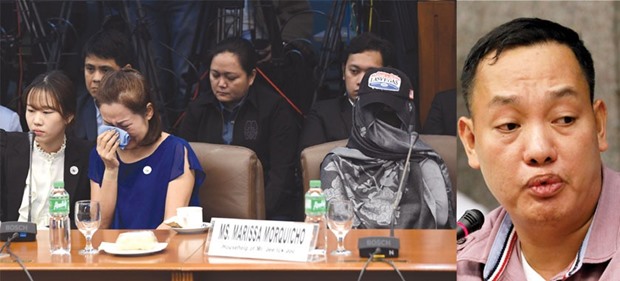Philippines President Rodrigo Duterte apologised to South Korea yesterday after policemen killed one of its citizens, then said he wanted to hang rogue police and send their heads to Seoul.
He called again for the death penalty to be reinstated so that he could hang 20 criminals a day.
Duterte promised the toughest punishment for those behind the kidnapping and killing of businessman Jee Ick-joo inside the national police headquarters in October.
“I will see to it that they are sentenced to the maximum,” he said of the policemen. “You give that power to me back again, I will execute them...
I’ll hang them in one day, 20 of them — 20 a day.”
He added: “You sons of *****, you policemen. You will suffer. I can maybe send your heads to South Korea.”
The death of the South Korean comes as the Philippine police face growing criticism from rights groups and some lawmakers, who say cover-ups and abuses of police power are rampant.
Duterte’s critics, however, say he is to blame for creating a culture of impunity by promising to protect police on the front lines of his war on drugs.
The police accused of kidnapping and killing Jee were anti-narcotics officers.
Capital punishment has been a priority for Duterte, whose allies introduced a death penalty bill in Congress on June 30 last year, the same day as his inauguration.
The draft, which is still being debated, says existing laws are no deterrent and had “emasculated” the criminal justice system.
The death penalty was repealed in 2006 following pressure from church groups.
A senate investigation into Jee’s killing began yesterday with police chief Ronald dela Rosa, a close ally of Duterte, saying he was “overcome by shame”.
“All indications point to an elaborate web of criminal activity by some police personnel operating under the cover of legitimate police operations,” he told the hearing.
Three Philippine police charged with robbery and extortion have been transferred instead of suspended or sacked, authorities said yesterday, fuelling concerns about immunity for rogue officers prosecuting President Rodrigo Duterte’s deadly drug war.
The announcement of the punishments for the trio came as a senate inquiry began into the murder of a South Korean businessman allegedly by anti-drug police officers who extorted money from his wife.
Critics of Duterte’s drug war, which has claimed more than 6,000 lives, say he has emboldened corrupt officers with his repeated pledges that he will shield police if they are charged for killing drug suspects.
Duterte personally ordered the three officers, accused of extorting a mother and son of 120,000 pesos ($2,400) last week in Manila, to the violence-plagued south of the country, a police statement said yesterday.
“This is part of the continuous internal cleansing of (the city police),” Guillermo Eleazar, their police chief in Quezon City, a district of the capital, said in the statement.
“(It) should serve as a lesson for those involved in illegal activities and also a stern warning for others not to do the same.”
Duterte had previously vowed to transfer corrupt policemen to an autonomous region in the strife-torn southern Philippines, where security forces are battling several militant groups, leading to protests from the local authorities.
“We need the best of our country’s police on our side — not the worst,” Mujiv Hataman, the regional governor, said this month.
“Erring law enforcers must be held accountable.
Sending them to the (region) is not a disciplinary action, rather it is a move that portrays our region as undeserving of dignified and dedicated public service.”
Duterte, 71, has said he must take extraordinary measures to prevent the Philippines from becoming a narco-state and Filipinos from becoming slaves to drugs.
Many Filipinos support the drug war.
But critics fear the police force, regarded as one of the most corrupt institutions in the country, is spearheading a campaign of extrajudicial killings while corrupt officers are using the campaign as cover for their own rackets.
Duterte said this week he would tolerate them earning “sideline” money, a euphemism for various corrupt activities, as long as that did not involve drugs.
National police chief Ronald Dela Rosa told the Senate inquiry yesterday that the anti-drugs officer accused of murdering the Korean businessman had been suspected of involvement in the kidnapping of a woman in 2007.
“How can a police officer with allegations of that sort be assigned to speciality units like the Anti-Illegal Drugs Group,” said Senator Vicente Sotto.

Choi Kyung-Jin (2nd L), wife of late South Korean businessman Jee Ick-Joo who was murdered allegedly by suspected policemen next to Marissa Morquicho (R), the house-help of her husband, as they appear at a Senate hearing into Jee’s death in Manila.
